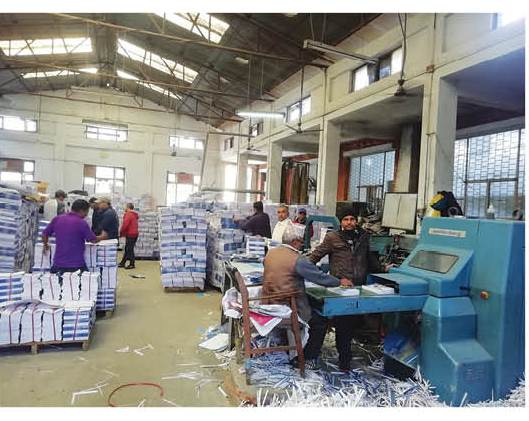Schools, parents push kids to formal education, killing their creativity

By Manjima Dhakal
Kathmandu, Feb. 16: The concept of early child education is meant for all-round development of children from play-based learning. But, majority of early child education institutions of the country are delivering early child education against its norms and values.
A lack of understanding of the importance of play is prompting parents and schools to push children towards numeracy and literacy even in early child development phase.
Early childhood - period between birth to 8 year - is a time of incredible physical, cognitive, socio-emotional, and language development. Early Child Development centers, Montessori schools and preschools, named whatever, operating both in government and private sector, basically enrolling children from two-and-a-half years to six years in their institutions in the country are pushing children to formal education, ECD experts said.
Agatha Thapa, ECD expert and founder of Setogurans, said in early childhood phase children’s brain is very open, so parents and others have to create an environment to make children’s brain very fertile (giving chance to observe things), rather than feeding the brain (imposing rules and knowledge forcefully). Therefore, if children don’t get chance to learn in a healthy environment the critical faculty of their brain will automatically decrease.
Aakriti Dhungana, Principal of Varnamala Preschool, Tyanglaphant, Kritipur said if children get love and attention from guardians and schools in the early childhood, they will also love in return because what they perceive in early childhood stays in memory for long.
Dhungana suggested that the early child education institutions should help children learn openly than teach anything. Imposing vague questions creates trouble for children, she said.
Sushila Aryal, Early Child Development section officer of the Ministry of Education, Science and Technology, said due to lack of uniformity in child development centres across the country, it seems to be producing manpower of different ability range.
According to Aryal, in lack of timely training to ECD teachers and also because of guardians’ interest, ECD centers are drifting towards formal education rather than play-based learning.
“Considering the same risk, now the Ministry has been doing homework to issue standards of Early Child Development Centres in coordination with concerned stakeholders. The standards will cover the areas of physical infrastructure, playing instruments and teaching-learning methods basically mandatory for all government and non-government ECDs across the country. After that the government will have the criteria in place to regulate ECD centres,” Aryal added.
The human brain is not fully developed at birth. A newborn’s brain is about a quarter of the size of the average adult brain. Incredibly, it doubles in size in the first year and keeps growing to about 80 per cent of adult size by age three and 90 per cent or nearly full grown by age five. So, the phase of early child development is sensitive, experts said.
Recent News

Do not make expressions casting dout on election: EC
14 Apr, 2022
CM Bhatta says may New Year 2079 BS inspire positive thinking
14 Apr, 2022
Three new cases, 44 recoveries in 24 hours
14 Apr, 2022
689 climbers of 84 teams so far acquire permits for climbing various peaks this spring season
14 Apr, 2022
How the rising cost of living crisis is impacting Nepal
14 Apr, 2022
US military confirms an interstellar meteor collided with Earth
14 Apr, 2022
Valneva Covid vaccine approved for use in UK
14 Apr, 2022
Chair Prachanda highlights need of unity among Maoist, Communist forces
14 Apr, 2022
Ranbir Kapoor and Alia Bhatt: Bollywood toasts star couple on wedding
14 Apr, 2022
President Bhandari confers decorations (Photo Feature)
14 Apr, 2022








